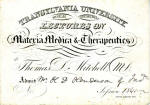Thomas Duche Mitchell, M.D. (1791-1865)
Click image to enlarge
Thomas Duche Mitchell, author and editor, received his early education in the Quaker schools and after a year in the drug store and chemical laboratory of Dr. Edward (?) Parrish, attended three courses of medical lectures at the University of Pennsylvania, from which he graduated in 1812. The honorary degree of A. M. was conferred on him by the trustees of Princeton College in 1830.
In 1812 he was appointed professor of vegetable and animal physiology in St John's Lutheran College, and in 1819 published a volume on medical chemistry. From 1822 to 1831 he was engaged in the practice of medicine at Frankford, near Philadelphia, while 1826 saw the Total Abstinence Society firmly established by him, he going so far as to deprecate the use of alcohol in the preparation of tinctures.
When Drake organized the Medical Department of Miami University in 1831, Dr. Mitchell was appointed professor of chemistry and pharmacy, at a salary of $2,000. Before the opening the scheme was abandoned, and Dr. Mitchell was made professor of chemistry in the Medical College of Ohio. In 1835 he accepted the chair of materia medica in Transylvania University, Lexington, Ky., where he remained until 1847, filling the chairs of chemistry as well as that of materia medica. In the year 1847 he returned to Philadelphia and took the chair of practice of medicine in the Philadelphia College of Medicine, and this he held until 1857 when he became professor of materia medica in Jefferson Medical Col- lege.
In 1832 he published an octavo volume of 553 pages on "Chemical Philosophy" on the basis of "The Elements of Chemistry," by Dr. Reid, of Edinburgh, and about the same time his "Hints to Students" appeared, and he became also co-editor of the Western Medical Gazette, with Profs. Eberle (q. v.) and Staughton, and editor of the Journal of Medical and Associate Sciences.
Another book came out in 1850, an octavo volume of 750 pages on "Materia Medica," also an edition of "Eberle on the Diseases of Children," to which he added notes and about 200 additional pages. His volume of 600 pages on the "Fevers of the United States" was never published. He was the biographer of John Eberle in "American Medical Biography," by Samuel D. Gross, M. D. As a writer and author he was indefatigable; as a lecturer, clear and impressive. A classical and scientific scholar, a rigidly upright and conscientious gentleman, he died in Philadelphia, May 13, 1865.
A list of his writings is in the "Surgeon- General's Catalogue," Washington, D. C.
